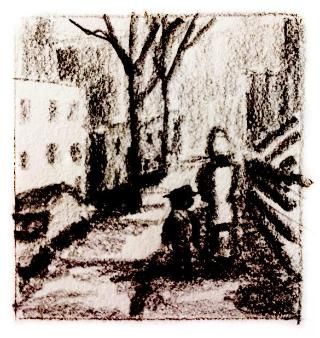Herman Harold Potok (whose Jewish name was Chaim Tzvi) was born in the Bronx on February 17, 1929, to Polish immigrant parents who raised him and his three siblings in an Orthodox Jewish community. His father, Benjamin Max Potok, was a World War I veteran who had met Potok’s mother Mollie in New York after fleeing pogroms in his home country after the war. Both Benjamin and Mollie encouraged their children to develop deep ties to their faith, and by the time the Potok children grew up, they had all either become or married rabbis.
The major historical background of Potok’s early life and adolescence was the global catastrophe of the Holocaust and World War II. As a child of Polish Jewish immigrants, Potok would have grown up into an awareness of the horrific and unfolding violence of the Holocaust from within a community deeply connected to its roots in the Old World. Though Potok rarely talked about this experience directly, the Holocaust, the war, and the subsequent creation of the State of Israel are all present in most of his written works—as undercurrents if not as main themes.
As a child, Potok attended an Orthodox yeshiva, studying Torah and Talmud in the morning and “secular subjects” required by the state in the afternoon. He continued to participate in Jewish education for the rest of his life, attending high school, college, and graduate school at Jewish institutions.
However, one part of Potok’s life in particular made him stand out in the sea of Orthodox life and education surrounding him: his love of fiction. The author often told his own history by tracing his vocation as a writer through readings of Evelyn Waugh’s Brideshead Revisited and Joyce’s Portrait of the Artist as a Young Man in high school and college. These novels gave him a window to the possibilities of fiction as a way to express his own experiences navigating a predominantly Christian and secular society as a child of Orthodox Judaism. Fictional stories also became a constant presence in Potok’s life—he describes staying up late to listen to The Lone Ranger on the radio as a child, and as an adult he watched Star Trek regularly.[1]
Like his protagonist Asher Lev, Potok was sometimes chastised by his parents and teachers for his desire to read and write fiction. In the Orthodox community where he grew up, spending too much time studying fiction was often viewed as a misguided if not sinful pursuit. Nevertheless, he continued to pursue his interest in reading and writing fiction, studying English literature in college and then earning a Master’s in Hebrew literature as a seminary student.

